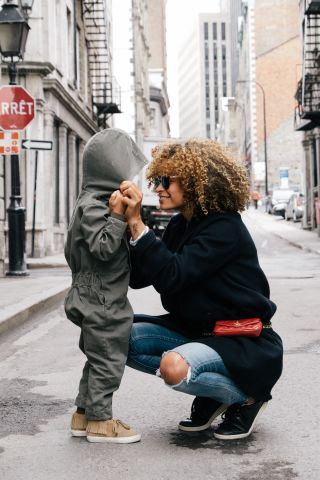Parenting
Lead Your Child With Love and Kindness
Leading with love means practicing and sharing our goodness with children.
Updated January 17, 2024 Reviewed by Ray Parker
Key points
- Brief, meaningful conversations encourage children's understanding of kindness, compassion, empathy, and love.
- We want to help children learn as many words as possible to express their feelings.
- Studies show that kindness is linked to better physical health, longevity, and happiness.

Leading with love means practicing and sharing our goodness with children. When we are engaging with children, here are a few best practices to try:
- Brief, meaningful conversations encourage and support children's understanding of concepts—like kindness, compassion, empathy, love, and friendship.
- Listen in on children's conversations and keep them percolating with simple questions or reflections on the conversation. We want to help children learn as many words as possible to express their feelings.
Children learn kindness best when adults model self-compassion and refrain from negative talk about themselves. Children learn by doing—encourage them to care for one another and share their feelings with friends, family, and teachers.
Researchers spend much time debating whether altruistic acts are truly selfless because we benefit greatly when we are kind to others. I think of kindness like laughter: We might laugh because we want someone else to feel good about their joke, but mostly, we laugh because it feels good. Like laughter, kindness is a terrific happiness habit for both our physical and emotional well-being.
Longer Healthier Lives
And kinder people live longer, healthier lives. People who volunteer tend to experience fewer aches and pains. People 55 and older who volunteer for two or more organizations have an impressive 44 percent lower likelihood of dying—and that's after sifting out every other contributing factor, including physical health, exercise, gender, habits like smoking, marital status, and many more. This is a more substantial effect than exercising four times a week or going to church; it means that volunteering is nearly as beneficial to our health as quitting smoking. We feel so good when we give because we get what researchers call a "helper high," or a distinct physical sensation associated with helping.

About half of the participants in one study reported feeling more robust and energetic after helping others; many also reported feeling calmer and less depressed, with increased feelings of self-worth. This is probably a literal "high," similar to a drug-induced high: for example, making a financial donation triggers the reward center in our brains that is responsible for dopamine-mediated euphoria.
Finally, nearest and dearest to my heart, leading with love and kindness makes us happy. Volunteer work substantially reduces symptoms of depression; both helping others and receiving help are associated with lowered anxiety and depression. It isn't just that kind people also tend to be healthier and happier, or that happy, healthy people are more kind. Experiments have repeatedly demonstrated that kindness toward others causes us to be happier, improves our health, and lengthens our lives.
So, if we want to raise kids who are happy and healthy, one of the best things we can do is teach them to be kind.
References
1. Raising Happiness: 10 Simple Steps for More Joyful Kids and Happier Parents Paperback. Christine Carter, Ph.D. Ballantine 2011
2. Altruism, happiness, and health: it’s good to be good. International Journal of Behavioral Medicine. June 2005
3. The impact of a new emotional self-management program on stress, emotions, heart rate variability, DHEA and cortisol. Integrative Psychological and Behavioral Science.


